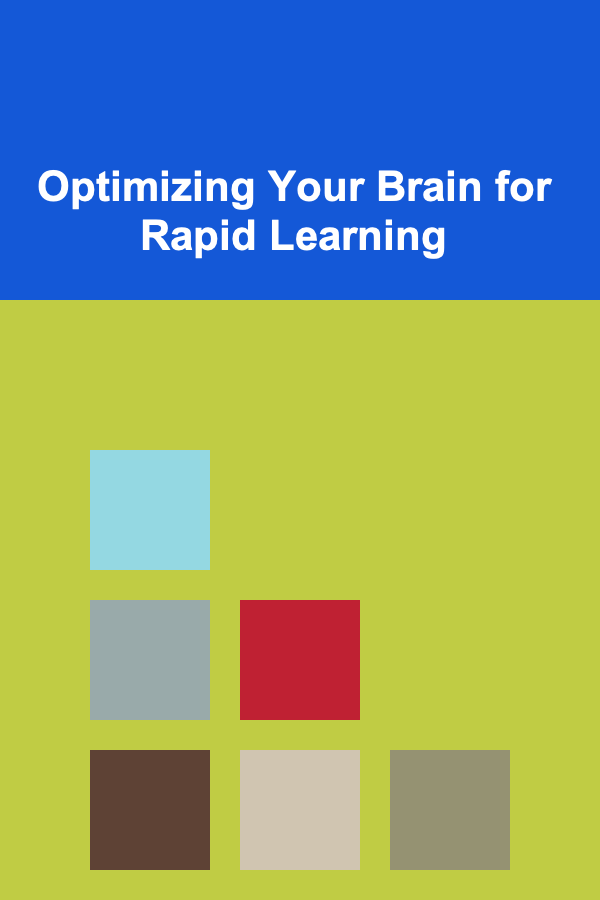
Optimizing Your Brain for Rapid Learning
ebook include PDF & Audio bundle (Micro Guide)
$12.99$10.99
Limited Time Offer! Order within the next:

In today's fast-paced world, the ability to learn quickly and effectively is more valuable than ever. Whether you're trying to master a new skill, stay ahead in your career, or simply expand your knowledge, optimizing your brain for rapid learning is a crucial advantage. This isn't about becoming a genius overnight; it's about understanding how your brain works and employing strategies that enhance its natural learning capabilities. This article explores a comprehensive approach to optimizing your brain for rapid learning, encompassing cognitive strategies, lifestyle adjustments, and leveraging technology.
Understanding the Neuroscience of Learning
Before diving into specific techniques, it's essential to understand the underlying neuroscience of learning. Learning involves creating new neural pathways and strengthening existing ones. This process relies heavily on several key brain functions:
- Neuroplasticity: The brain's ability to reorganize itself by forming new neural connections throughout life. This is the foundation of learning.
- Synaptic Pruning: The brain eliminates unused or weak connections to make room for stronger, more efficient pathways. This "use it or lose it" principle highlights the importance of consistent practice and reinforcement.
- Memory Consolidation: The process of converting short-term memories into long-term memories, primarily occurring during sleep.
- Neurotransmitters: Chemicals like dopamine, serotonin, and acetylcholine play crucial roles in motivation, mood, and cognitive function, all of which impact learning.
Understanding these principles allows us to tailor our learning strategies to align with how the brain naturally processes information. For example, recognizing the importance of synaptic pruning underscores the necessity of spaced repetition, which forces the brain to reactivate and strengthen connections at spaced intervals, rather than cramming information all at once.
Cognitive Strategies for Enhanced Learning
Cognitive strategies are techniques that directly influence how you process and retain information. These strategies focus on actively engaging with the material and manipulating it in ways that promote deeper understanding and recall.
1. Active Recall: Testing Yourself
Active recall involves retrieving information from memory without looking at your notes or resources. This is far more effective than passively rereading material. The act of retrieval strengthens the neural pathways associated with the information, making it easier to recall in the future.
How to Implement Active Recall:
- Flashcards: Use flashcards to quiz yourself on key concepts, terms, or formulas.
- Practice Questions: Answer practice questions without referring to the textbook or notes. Identify areas where you struggle and focus your study efforts accordingly.
- Spaced Repetition Software (SRS): Utilize SRS programs like Anki or SuperMemo, which use algorithms to schedule reviews based on your performance, ensuring that you review information just before you forget it. This maximizes retention and minimizes wasted effort.
- The Feynman Technique: Explain the concept you are trying to learn in simple terms, as if you were teaching it to someone else (even a child). Identify gaps in your understanding and fill them in. This forces you to process the information deeply and identify areas where you need further clarification.
2. Spaced Repetition: Distributing Learning Over Time
Spaced repetition capitalizes on the forgetting curve, which demonstrates that we rapidly lose information shortly after learning it. By reviewing material at increasing intervals, we can combat this forgetting and solidify long-term memory.
How to Implement Spaced Repetition:
- Schedule Reviews: Plan regular review sessions, spacing them out over days, weeks, and months.
- Utilize SRS: As mentioned above, SRS programs automate the spaced repetition process, making it easier and more efficient.
- Revisit Notes: Regularly revisit your notes and highlight key concepts.
3. Interleaving: Mixing Different Subjects
Interleaving involves mixing up the topics you are studying, rather than focusing on one topic for an extended period. This forces your brain to actively discriminate between different concepts and retrieve the appropriate information, leading to deeper understanding and better retention.
How to Implement Interleaving:
- Switch Topics Regularly: Alternate between different subjects or topics during your study sessions.
- Practice Mixed Problems: When practicing problem-solving, mix up the types of problems you are working on. This will challenge you to identify the appropriate strategy for each problem.
4. Elaborative Interrogation: Asking "Why?"
Elaborative interrogation involves asking yourself "why" a particular concept is true or relevant. This encourages you to connect new information to your existing knowledge, creating more meaningful and lasting memories.
How to Implement Elaborative Interrogation:
- Question Everything: When learning something new, ask yourself why it is true or why it matters.
- Relate to Existing Knowledge: Connect the new information to what you already know.
- Seek Explanations: If you don't understand something, seek out explanations from different sources until you grasp the concept.
5. Dual Coding: Combining Visuals and Text
Dual coding theory suggests that we process information more effectively when we combine visual and verbal representations. Using both modalities strengthens memory and facilitates recall.
How to Implement Dual Coding:
- Use Images and Diagrams: Incorporate images, diagrams, and charts into your notes and study materials.
- Create Mind Maps: Use mind maps to visually organize information and connect different concepts.
- Watch Videos: Supplement your reading with videos that explain the concepts in a visual way.
6. Metacognition: Thinking About Your Thinking
Metacognition is the awareness and understanding of your own thought processes. By reflecting on how you learn, you can identify your strengths and weaknesses and tailor your learning strategies accordingly.
How to Implement Metacognition:
- Reflect on Your Learning: After each study session, take a few minutes to reflect on what you learned, what you struggled with, and what you could do differently next time.
- Monitor Your Understanding: Constantly assess your understanding of the material. If you are unsure about something, seek clarification.
- Experiment with Different Strategies: Try different learning strategies and see what works best for you.
Lifestyle Adjustments for Optimal Brain Function
Cognitive strategies are powerful, but they are most effective when combined with a healthy lifestyle that supports optimal brain function. These adjustments focus on providing your brain with the necessary resources and conditions to thrive.
1. Sleep: Prioritizing Rest and Recovery
Sleep is crucial for memory consolidation and overall cognitive function. During sleep, the brain processes and consolidates information learned during the day, transferring it from short-term to long-term memory. Lack of sleep impairs cognitive performance, including attention, memory, and decision-making.
How to Improve Sleep:
- Establish a Regular Sleep Schedule: Go to bed and wake up at the same time each day, even on weekends.
- Create a Relaxing Bedtime Routine: Avoid screen time before bed, and engage in relaxing activities such as reading or taking a warm bath.
- Optimize Your Sleep Environment: Make sure your bedroom is dark, quiet, and cool.
- Limit Caffeine and Alcohol: Avoid caffeine and alcohol close to bedtime.
2. Nutrition: Fueling Your Brain
The brain requires a steady supply of nutrients to function optimally. A healthy diet rich in fruits, vegetables, whole grains, and lean protein provides the necessary fuel for cognitive performance.
Key Nutrients for Brain Health:
- Omega-3 Fatty Acids: Found in fish, nuts, and seeds, omega-3 fatty acids are essential for brain health and cognitive function.
- Antioxidants: Found in fruits and vegetables, antioxidants protect the brain from damage caused by free radicals.
- B Vitamins: Essential for energy production and nerve function.
- Choline: Important for memory and learning, found in eggs and liver.
Foods to Limit:
- Processed Foods: High in sugar, unhealthy fats, and sodium, processed foods can negatively impact brain function.
- Sugary Drinks: Can lead to blood sugar spikes and crashes, impairing cognitive performance.
3. Exercise: Boosting Blood Flow and Neurogenesis
Regular physical exercise is beneficial for both physical and mental health. Exercise increases blood flow to the brain, which delivers oxygen and nutrients, promoting neurogenesis (the creation of new brain cells) and improving cognitive function.
Types of Exercise:
- Aerobic Exercise: Activities like running, swimming, and cycling increase heart rate and blood flow.
- Strength Training: Helps build muscle mass and improve overall physical health, indirectly benefiting brain function.
Recommended Amount: Aim for at least 30 minutes of moderate-intensity exercise most days of the week.
4. Stress Management: Reducing Cognitive Load
Chronic stress can negatively impact cognitive function by increasing levels of cortisol, a stress hormone that can damage brain cells. Managing stress is crucial for maintaining optimal brain function and promoting learning.
Stress Management Techniques:
- Mindfulness Meditation: Focusing on the present moment can help reduce stress and improve attention.
- Deep Breathing Exercises: Slow, deep breathing can activate the parasympathetic nervous system, promoting relaxation.
- Yoga and Tai Chi: Combine physical activity with mindfulness, reducing stress and improving flexibility.
- Spending Time in Nature: Studies have shown that spending time in nature can reduce stress and improve cognitive function.
5. Hydration: Ensuring Optimal Brain Function
Dehydration can impair cognitive function, including attention, memory, and mood. Drinking enough water is essential for maintaining optimal brain function.
Recommended Daily Intake: Aim for at least eight glasses of water per day, more if you are physically active.
Leveraging Technology for Rapid Learning
Technology offers a wealth of resources and tools that can enhance the learning process. From online courses and educational apps to productivity tools and collaboration platforms, technology can help you learn faster and more effectively.
1. Online Courses and Educational Platforms
Platforms like Coursera, edX, and Khan Academy offer a vast library of online courses and educational materials on a wide range of subjects. These resources provide access to high-quality education from top universities and experts around the world.
Benefits:
- Flexibility: Learn at your own pace and on your own schedule.
- Variety: Access a wide range of courses and topics.
- Affordability: Many courses are free or low-cost.
2. Educational Apps and Tools
Numerous educational apps and tools are available to help you learn specific skills or subjects. These apps often use gamification and interactive elements to make learning more engaging and effective.
Examples:
- Duolingo: Learn a new language through gamified lessons.
- Memrise: Memorize vocabulary and facts using spaced repetition and mnemonics.
- Brilliant.org: Learn math and science concepts through interactive problem-solving.
3. Productivity Tools and Note-Taking Apps
Productivity tools and note-taking apps can help you organize your learning materials, manage your time, and stay focused on your goals.
Examples:
- Evernote: Take notes, organize research, and collaborate with others.
- Notion: A versatile workspace for note-taking, project management, and collaboration.
- Trello: A project management tool for organizing tasks and tracking progress.
4. Collaboration Platforms
Collaboration platforms can help you connect with other learners, share ideas, and get feedback on your work.
Examples:
- Slack: A messaging app for team communication and collaboration.
- Discord: A voice and text chat platform for communities and groups.
- Google Docs: A collaborative document editing tool.
Cultivating a Growth Mindset
Finally, one of the most important aspects of optimizing your brain for rapid learning is cultivating a growth mindset. A growth mindset is the belief that your abilities and intelligence can be developed through dedication and hard work. People with a growth mindset embrace challenges, persevere through setbacks, and see effort as a path to mastery.
How to Cultivate a Growth Mindset:
- Embrace Challenges: View challenges as opportunities for growth and learning.
- Persist Through Setbacks: Don't give up when you encounter difficulties. Learn from your mistakes and keep trying.
- See Effort as a Path to Mastery: Believe that hard work and dedication can lead to improvement.
- Learn from Criticism: Use criticism as an opportunity to identify areas for improvement.
- Be Inspired by the Success of Others: View the success of others as evidence that you can also achieve your goals.
By adopting a growth mindset, you can unlock your full learning potential and achieve your goals.
Conclusion
Optimizing your brain for rapid learning is a multifaceted process that requires a holistic approach. By incorporating cognitive strategies like active recall, spaced repetition, and interleaving, making lifestyle adjustments to prioritize sleep, nutrition, and exercise, leveraging technology to access educational resources and productivity tools, and cultivating a growth mindset, you can unlock your full learning potential and thrive in today's ever-changing world. Remember that learning is a journey, not a destination. Embrace the process, be patient with yourself, and celebrate your progress along the way.

Electrical Engineer's Handbook: Advanced Techniques for System Optimization and Safety
Read More
How to Create a Family Bucket List for the Year Ahead
Read More
How To Manage Invasive Species Impacting Wildlife
Read More
How to Use AR for Gaming Experiences
Read More
Understanding Basic Videography Composition
Read More
How to Hydrate Your Body Skin in Winter: A Comprehensive Guide
Read MoreOther Products

Electrical Engineer's Handbook: Advanced Techniques for System Optimization and Safety
Read More
How to Create a Family Bucket List for the Year Ahead
Read More
How To Manage Invasive Species Impacting Wildlife
Read More
How to Use AR for Gaming Experiences
Read More
Understanding Basic Videography Composition
Read More